The Intel 9th Gen Review: Core i9-9900K, Core i7-9700K and Core i5-9600K Tested
by Ian Cutress on October 19, 2018 9:00 AM EST- Posted in
- CPUs
- Intel
- Coffee Lake
- 14++
- Core 9th Gen
- Core-S
- i9-9900K
- i7-9700K
- i5-9600K
CPU Performance: Rendering Tests
Rendering is often a key target for processor workloads, lending itself to a professional environment. It comes in different formats as well, from 3D rendering through rasterization, such as games, or by ray tracing, and invokes the ability of the software to manage meshes, textures, collisions, aliasing, physics (in animations), and discarding unnecessary work. Most renderers offer CPU code paths, while a few use GPUs and select environments use FPGAs or dedicated ASICs. For big studios however, CPUs are still the hardware of choice.
All of our benchmark results can also be found in our benchmark engine, Bench.
Corona 1.3: Performance Render
An advanced performance based renderer for software such as 3ds Max and Cinema 4D, the Corona benchmark renders a generated scene as a standard under its 1.3 software version. Normally the GUI implementation of the benchmark shows the scene being built, and allows the user to upload the result as a ‘time to complete’.
We got in contact with the developer who gave us a command line version of the benchmark that does a direct output of results. Rather than reporting time, we report the average number of rays per second across six runs, as the performance scaling of a result per unit time is typically visually easier to understand.
The Corona benchmark website can be found at https://corona-renderer.com/benchmark
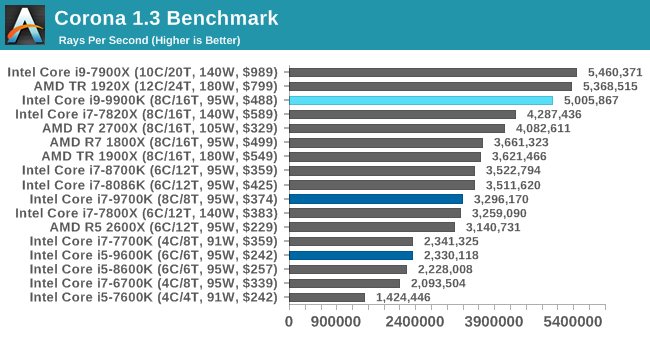
Corona is a fully multithreaded test, so the non-HT parts get a little behind here. The Core i9-9900K blasts through the AMD 8-core parts with a 25% margin, and taps on the door of the 12-core Threadripper.
Blender 2.79b: 3D Creation Suite
A high profile rendering tool, Blender is open-source allowing for massive amounts of configurability, and is used by a number of high-profile animation studios worldwide. The organization recently released a Blender benchmark package, a couple of weeks after we had narrowed our Blender test for our new suite, however their test can take over an hour. For our results, we run one of the sub-tests in that suite through the command line - a standard ‘bmw27’ scene in CPU only mode, and measure the time to complete the render.
Blender can be downloaded at https://www.blender.org/download/
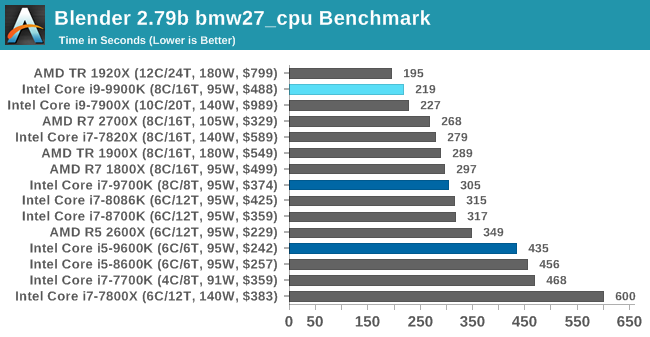
Blender has an eclectic mix of requirements, from memory bandwidth to raw performance, but like Corona the processors without HT get a bit behind here. The high frequency of the 9900K pushes it above the 10C Skylake-X part, and AMD's 2700X, but behind the 1920X.
LuxMark v3.1: LuxRender via Different Code Paths
As stated at the top, there are many different ways to process rendering data: CPU, GPU, Accelerator, and others. On top of that, there are many frameworks and APIs in which to program, depending on how the software will be used. LuxMark, a benchmark developed using the LuxRender engine, offers several different scenes and APIs.
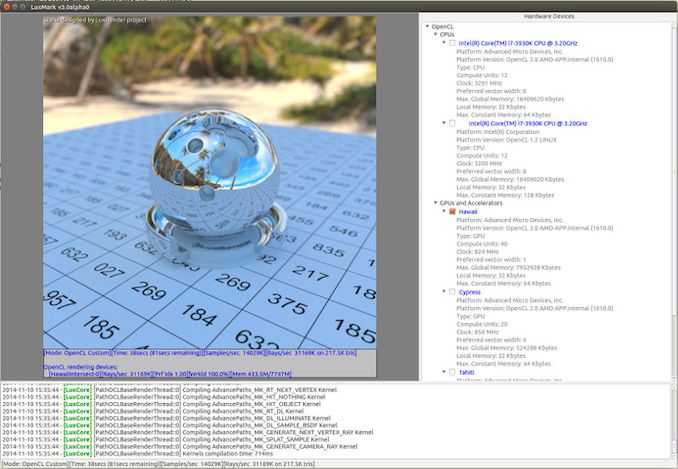
Taken from the Linux Version of LuxMark
In our test, we run the simple ‘Ball’ scene on both the C++ and OpenCL code paths, but in CPU mode. This scene starts with a rough render and slowly improves the quality over two minutes, giving a final result in what is essentially an average ‘kilorays per second’.
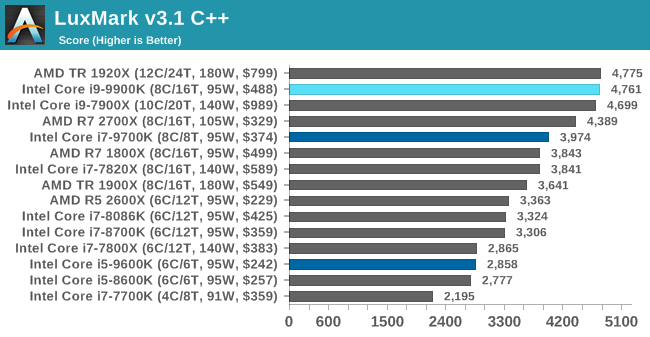
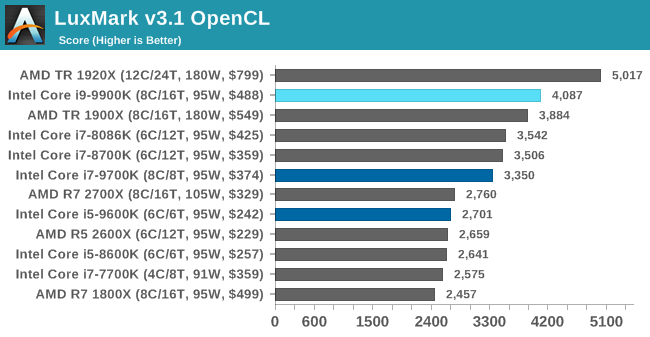
POV-Ray 3.7.1: Ray Tracing
The Persistence of Vision ray tracing engine is another well-known benchmarking tool, which was in a state of relative hibernation until AMD released its Zen processors, to which suddenly both Intel and AMD were submitting code to the main branch of the open source project. For our test, we use the built-in benchmark for all-cores, called from the command line.
POV-Ray can be downloaded from http://www.povray.org/
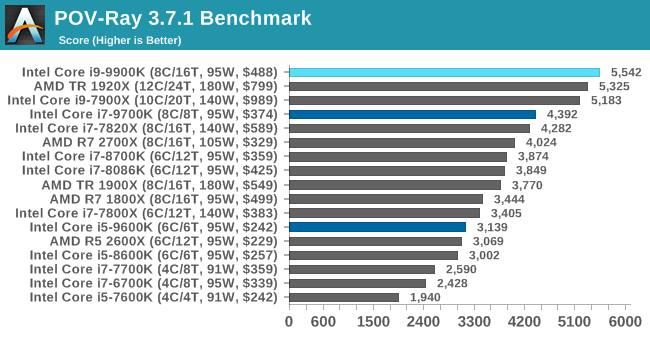


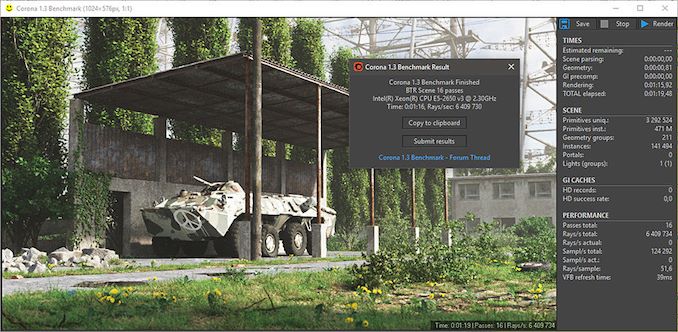








274 Comments
View All Comments
The Original Ralph - Saturday, October 20, 2018 - link
sorry, B&H's availability date should be JAN 1, 2100eastcoast_pete - Saturday, October 20, 2018 - link
JAN 1, 2100? Intel's manufacturing problems must be at lot more serious than we knew (:I wonder if the 9900K will be supported by "Windows 21" when they finally ship?
cubebomb - Saturday, October 20, 2018 - link
you guys need to stop posting 1080p benchmarks for games already. come on now.gammaray - Sunday, October 21, 2018 - link
I agree, 1440p and higher, especially with the top CPUsmapesdhs - Sunday, October 21, 2018 - link
They would of course respond that they have to show 1080p in order to reveal CPU differences, even if the frame rates are so high that most people wouldn't care anyway. I suppose those who do game at 1080p on high refresh monitors would say they care about the data, but then the foundation of the RTX launch is a new pressure to move away from high refresh rates, something the aforementioned group of gamers physically cannot do.piroroadkill - Monday, October 22, 2018 - link
They need to show a meaningful difference between CPUs. setting a higher resolution makes the tests worthless, as you'll just be GPU bottlenecked.eva02langley - Monday, October 22, 2018 - link
They are important since they bring in perspective CPU bottleneck, however it is widely overpreached.1080p, 1440p and 2160p at max settings... enough said. Without multiple resolutions benchmarks, it is impossible to get a clear picture of the real performances to expect from a potential system.
However, basically, a value rating system is now MANDATORY. It doesn't make any sense that the 9900k received 90% + score on Toms and WCCF. They offer abysmal value for gamers, so it is not "The Best Gaming CPU", however it is the "strongest"
DominionSeraph - Monday, October 22, 2018 - link
It's $110 over the i7. If you're looking at a $2500 i7 rig, going to $2610 with an i9 is a 4% increase in price. Looks to me like it generally wins by over 4%. That's a really good value for a content creator since it stomps the i7 by over 20%.Chestertonian - Wednesday, February 27, 2019 - link
No kidding. Why are there barely any 1440p benchmarks, but there are tons of 8k benchmarks? I don't get it.avatar-ds - Sunday, October 21, 2018 - link
Something's fishy with the 8086k consistently underperforming the 8700k in many (most?) gaming tests by more than a margin of error where differences are significant enough. Undermines credibility of the whole thing.